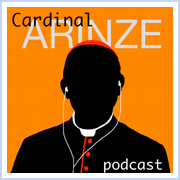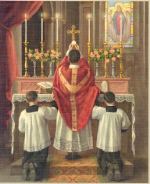From: Matthew 18:1-5, 10
The "Little Ones" and the Kingdom. The Lost Sheep
--------------------------------------------------
[1] At that time, the disciples came to Jesus, saying, "Who is the greatest in the Kingdom of Heaven?" [2] And calling to Him a child, He put him in the midst of them, [3] and said, "Truly, I say to you, unless you turn and become like children, you will never enter the Kingdom of Heaven. [4] Whoever humbles himself like this child, he is the greatest in the Kingdom of Heaven.
[5] "Whoever receives one such child in My name receives Me.
[10] "See that you do not despise one of these little ones; for I tell you that in Heaven their angels always behold the face of My Father who is in Heaven.
***********************************************************************
Commentary:
1-35. The teachings of Jesus recorded in chapter 18 of St. Matthew are often called the "discourse on the Church" or "ecclesiastical discourse" because they are a series of instructions on the way in which His Church is to be administered.
The first passage (Matthew 18:1-5), addressed to leaders, that is, the future hierarchy of the Church, warns them against natural tendencies to pride and ambition: even though they have positions of government, they must act with humility. In verses 6-10 Jesus emphasizes the fatherly care which pastors of the Church should have for the "little ones"--a term which covers everyone in need of special care for whatever reason (because they are recent converts, or are not well grounded in Church teaching, or are not yet adults, etc.)... God takes special care of the weak and will punish those who harm them.
Our Lord shows similar concern for those who are experiencing spiritual difficulties. Every effort, even an heroic effort, must be made to seek out the "lost sheep" (verses 12-14). If the Church in general and each Christian in particular should be concerned to spread the Gospel, all the more reason for them to try and see that those who already embraced the faith do not go astray...
Thus, the whole of Chapter 18, the "discourse of the Church", is a survey of the future history of the Church during its earthly stage, and a series of practical rules for conduct for Christians--a kind of complement to the Sermon on the Mount, (Chapters 5-7), which is a "magna carta" for the new Kingdom established by Christ.
1-6. Clearly the disciples still suffer from human ambition: they want to occupy key positions when Jesus comes to establish the Kingdom on earth (cf. Acts 1:6). To correct their pride, our Lord shows them a child and tells them that if they want to enter the Kingdom of Heaven, they must decide to be like children: children are incapable of hating anyone and are totally innocent of vice, particularly of pride, the worst vice of all. They are simple and full of trust.
Humility is one of the main pillars of the Christian life. "If you ask me", St. Augustine says, "what is the essential thing in the religion and discipline of Jesus Christ, I shall reply: first humility, second humility and third humility" ("Letter 118").
3-4. Applying these words to our Lord's virtues, Fray Luis de Granada makes the point that humility is superior to virginity: "If you cannot imitate the virginity of the humble, then imitate the humility of the virgin. Virginity is praiseworthy, but humility is more necessary. The former is recommended to us, the latter is an obligation for us; to the former we are invited, to the latter we are obliged [...]. And so we see that the former is celebrated as voluntary sacrifice, the latter required as an obligatory sacrifice. Lastly, you can be saved without virginity, but not without humility" ("Summa De La Vida Cristiana", Book 3, Part 2, Chapter 10).
5. Receiving a child in Jesus' name is the same as receiving Jesus Himself. Because children reflect the innocence, purity, simplicity and tenderness of our Lord, "In children and in the sick a soul in love sees Him" ([St] J. Escriva, "The Way", 419).
10. Jesus warns that giving scandal to little children is a very serious matter, for they have angels who guard them, who will plead a case before God against those who led them to commit sin.
In this context He speaks of children having guardian angels. However, everyone, adult or child, has a guardian angel. "By God's providence angels have been entrusted with the office of guarding the human race and of accompanying every human being so as to preserve him from any serious dangers [...]. Our Heavenly Father has placed over each of us an angel under whose protection and vigilance we are" ("St. Pius V Catechism", IV, 9, 4).
This means that we should have a trusting relationship with our guardian angel. "Have confidence in your guardian Angel. Treat him as a lifelong friend--that is what he is--and he will render you a thousand services in the ordinary affairs of each day" ([St] J. Escriva, "The Way", 562).
***********************************************************************
Source: "The Navarre Bible: Text and Commentaries". Biblical text taken from the Revised Standard Version and New Vulgate. Commentaries made by members of the Faculty of Theology of the University of Navarre, Spain. Published by Four Courts Press, Kill Lane, Blackrock, Co. Dublin, Ireland.
Reprinted with permission from Four Courts Press and Scepter Publishers, the U.S. publisher.









